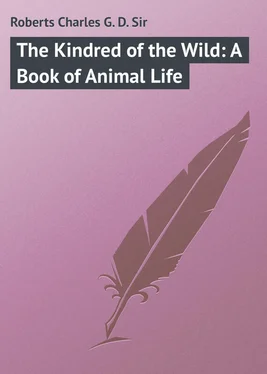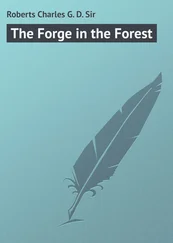Charles Roberts - The Kindred of the Wild - A Book of Animal Life
Здесь есть возможность читать онлайн «Charles Roberts - The Kindred of the Wild - A Book of Animal Life» — ознакомительный отрывок электронной книги совершенно бесплатно, а после прочтения отрывка купить полную версию. В некоторых случаях можно слушать аудио, скачать через торрент в формате fb2 и присутствует краткое содержание. Жанр: foreign_language, foreign_prose, на английском языке. Описание произведения, (предисловие) а так же отзывы посетителей доступны на портале библиотеки ЛибКат.
- Название:The Kindred of the Wild: A Book of Animal Life
- Автор:
- Жанр:
- Год:неизвестен
- ISBN:нет данных
- Рейтинг книги:3 / 5. Голосов: 1
-
Избранное:Добавить в избранное
- Отзывы:
-
Ваша оценка:
- 60
- 1
- 2
- 3
- 4
- 5
The Kindred of the Wild: A Book of Animal Life: краткое содержание, описание и аннотация
Предлагаем к чтению аннотацию, описание, краткое содержание или предисловие (зависит от того, что написал сам автор книги «The Kindred of the Wild: A Book of Animal Life»). Если вы не нашли необходимую информацию о книге — напишите в комментариях, мы постараемся отыскать её.
The Kindred of the Wild: A Book of Animal Life — читать онлайн ознакомительный отрывок
Ниже представлен текст книги, разбитый по страницам. Система сохранения места последней прочитанной страницы, позволяет с удобством читать онлайн бесплатно книгу «The Kindred of the Wild: A Book of Animal Life», без необходимости каждый раз заново искать на чём Вы остановились. Поставьте закладку, и сможете в любой момент перейти на страницу, на которой закончили чтение.
Интервал:
Закладка:
The handle of the great scoop-net was about eight feet in length. Its butt the trapper drove slantingly into the sand where the water was an inch or two deep, bracing it securely with stones. He fixed it at an angle so acute that the rim of the net lay almost flat at a height of about four feet above the stone whereon the eagle was wont to perch. Under the uppermost edge of the hoop the trapper fixed a firm prop, making the structure steady and secure. The drooping slack of the net he then caught up and held lightly in place on three or four willow twigs, so that it all lay flat within the rim. This accomplished to his satisfaction, he scattered fish upon the ground as usual, most of them close about the stone and within the area overshadowed by the net, but two or three well outside. Then he paddled noiselessly away across the moon-silvered mirror of the lake, and disappeared into the blackness about the outlet.
On the following morning, the king sat upon his watch-tower while the first light gilded the leaning summit of Sugar Loaf. His gaze swept the vast and shadowy basin of the landscape with its pointed tree-tops dimly emerging above the vapour-drift, and its blank, pallid spaces whereunder the lakes lay veiled in dream. His golden eye flamed fiercely under the straight and fierce white brow; nevertheless, when he saw, far down, two ducks winging their way across the lake, now for a second visible, now vanishing in the mist, he suffered them to go unstricken. The clear light gilded the white feathers of his head and tail, but sank and was absorbed in the cloudy gloom of his wings. For fully half an hour he sat in regal immobility. But when at last the waters of Big Squatook were revealed, stripped and gleaming, he dropped from his perch in a tremendous, leisurely curve, and flew over to the point of shoals.
As he drew near, he was puzzled and annoyed to see the queer structure that had been erected during the night above his rock. It was inexplicable. He at once checked his flight and began whirling in great circles, higher and higher, over the spot, trying in vain to make out what it was. He could see that the dead fish were there as usual. And at length he satisfied himself that no hidden peril lurked in the near-by huckleberry thicket. Then he descended to the nearest tree-top and spent a good half-hour in moveless watching of the net. He little guessed that a dusky figure, equally moveless and far more patient, was watching him in turn from a thicket across the lake.
At the end of this long scrutiny, the eagle decided that a closer investigation was desirable. He flew down and alighted on the level sand well away from the net. There he found a fish which he devoured. Then he found another; and this he carried away to the eyrie. He had not solved the mystery of the strange structure overhanging the rock, but he had proved that it was not actively inimical. It had not interfered with his morning meal, or attempted to hinder him from carrying off his customary spoils. When he returned an hour later to the point of shoals the net looked less strange to him. He even perched on the sloping handle, balancing himself with outspread wings till the swaying ceased. The thing was manifestly harmless. He hopped down, looked with keen interested eyes at the fish beside the rock, hopped in and clutched one out with beak and claw, hopped back again in a great hurry, and flew away with the prize to his watch-tower on Sugar Loaf. This caution he repeated at every visit throughout that day. But when he came again on the morrow, he had grown once more utterly confident. He went under the net without haste or apprehension, and perched unconcernedly on the stone in the midst of his banquet. And the stony face of the old Indian, in his thicket across the lake, flashed for one instant with a furtive grin. He grunted, melted back into the woods, and slipped away to resume his fishing at the outlet.
The next morning, about an hour before dawn, a ghostly birch canoe slipped up to the point of shoals, and came to land about a hundred yards from the net. The Indian stepped out, lifted it from the water, and hid it in the bushes. Then he proceeded to make some important changes in the arrangement of the net.
To the topmost rim of the hoop he tied a strong cord, brought the free end to the ground, led it under a willow root, and carried it some ten paces back into the thicket. Next he removed the supporting prop. Going back into the thicket, he pulled the cord. It ran freely under the willow root, and the net swayed down till it covered the rock, to rebound to its former position the moment he released the cord. Then he restored the prop to its place; but this time, instead of planting its butt firmly in the sand, he balanced it on a small flat stone, so that the least pull would instantaneously dislodge it. To the base of the prop he fixed another cord; and this also he ran under the willow root and carried back into the thicket. To the free end of this second cord he tied a scrap of red flannel, that there might be no mistake at a critical moment. The butt of the handle he loosened, so that if the prop were removed the net would almost fall of its own weight; and on the upper side of the butt, to give steadiness and speed of action, he leaned two heavy stones. Finally, he baited his trap with the usual dead fish, bunching them now under the centre of the net. Then, satisfying himself that all was in working order, he wormed his way into the heart of the thicket. A few leafy branches, cunningly disposed around and above his hiding-place, made his concealment perfect, while his keen black beads of eyes commanded a clear view of the stone beneath the net. The ends of the two cords were between his lean fingers. No waiting fox or hiding grouse could have lain more immovable, could have held his muscles in more patient perfect stillness, than did the wary old trapper through the chill hour of growing dawn.
At last there came a sound that thrilled even such stoic nerves as his. Mighty wings hissed in the air above his head. The next moment he saw the eagle alight upon the level sand beside the net. This time there was no hesitation. The great bird, for all his wisdom, had been lured into accepting the structure as a part of the established order of things. He hopped with undignified alacrity right under the net, clutched a large whitefish, and perched himself on the stone to enjoy his meal.
At that instant he felt, rather than saw, the shadow of a movement in the thicket. Or rather, perhaps, some inward, unaccredited guardian signalled to him of danger. His muscles gathered themselves for that instantaneous spring wherewith he was wont to hurl himself into the air. But even that electric speed of his was too slow for this demand. Ere he could spring, the great net came down about him with a vicious swish; and in a moment beating wings, tearing beak, and clutching talons were helplessly intertangled in the meshes. Before he could rip himself free, a blanket was thrown over him. He was ignominiously rolled into a bundle, picked up, and carried off under the old Indian’s arm.
III
When the king was gone, it seemed as if a hush had fallen over the country of the Squatooks. When the old pine beneath the toppling peak of Sugar Loaf had stood vacant all the long golden hours of the morning, two crows flew up from the fir-woods to investigate. They hopped up and down on the sacred seat, cawing impertinently and excitedly. Then in a sudden flurry of apprehension they darted away. News of the great eagle’s mysterious absence spread quickly among the woodfolk, – not by direct communication, indeed, except in the case of the crows, but subtly and silently, as if by some telepathic code intelligible alike to mink and wood-mouse, kingfisher and lucifee.
When the noon had gone by, and the shadow of Sugar Loaf began to creep over the edge of the nest, the old mother eagle grew uneasy at the prolonged absence of her mate. Never before since the nestlings broke the shell had he been so long away. Never before had she been compelled to realise how insatiable were the appetites of her young. She flew around to the pine-tree on the other side of the peak, – and finding it vacant, something told her it had been long unoccupied. Then she flew hither and thither over all the lakes, a fierce loneliness growing in her heart. From the long grasses around the mouth of the thoroughfare between third and fourth lakes a heron arose, flapping wide bluish wings, and she dropped upon it savagely. However her wild heart ached, the nestlings must be fed. With the long limp neck and slender legs of the heron trailing from her talons, she flew away to the eyrie; and she came no more to the Squatooks.
Читать дальшеИнтервал:
Закладка:
Похожие книги на «The Kindred of the Wild: A Book of Animal Life»
Представляем Вашему вниманию похожие книги на «The Kindred of the Wild: A Book of Animal Life» списком для выбора. Мы отобрали схожую по названию и смыслу литературу в надежде предоставить читателям больше вариантов отыскать новые, интересные, ещё непрочитанные произведения.
Обсуждение, отзывы о книге «The Kindred of the Wild: A Book of Animal Life» и просто собственные мнения читателей. Оставьте ваши комментарии, напишите, что Вы думаете о произведении, его смысле или главных героях. Укажите что конкретно понравилось, а что нет, и почему Вы так считаете.












